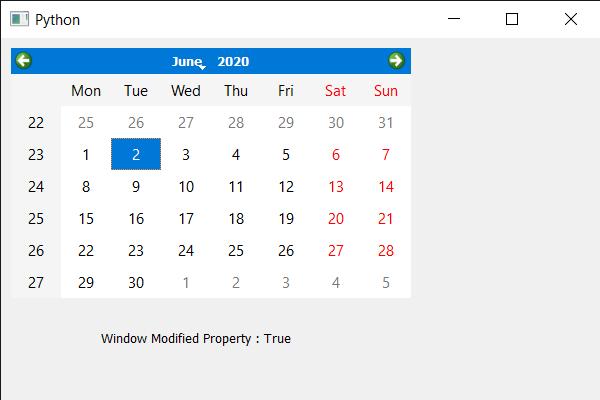En este artículo veremos cómo podemos obtener la propiedad de ventana modificada de QCalendarWidget. La propiedad modificada de la ventana se mantiene si el calendario que se muestra en la ventana tiene cambios no guardados o no, por defecto esta propiedad es Falso aunque podemos cambiar esto con la ayuda del setWindowModifiedmétodo.
Nota: si un QCalendarWidget se configura como modificado, todos sus ancestros también se configurarán como modificados.
Para hacer esto, usaremos
isWindowModifiedel método con el objeto QCalendarWidget.Sintaxis: calendar.isWindowModified()
Argumento: no requiere argumento
Return : Devuelve bool
A continuación se muestra la implementación.
Python3
# importing libraries
from PyQt5.QtWidgets import *
from PyQt5 import QtCore, QtGui
from PyQt5.QtGui import *
from PyQt5.QtCore import *
import sys
class Window(QMainWindow):
def __init__(self):
super().__init__()
# setting title
self.setWindowTitle("Python ")
# setting geometry
self.setGeometry(100, 100, 600, 400)
# calling method
self.UiComponents()
# showing all the widgets
self.show()
# method for components
def UiComponents(self):
# creating a QCalendarWidget object
calender = QCalendarWidget(self)
# setting geometry to the calendar
calender.setGeometry(10, 10, 400, 250)
# setting window modified property
calender.setWindowModified(True)
# creating label
label = QLabel(self)
# setting geometry to the label
label.setGeometry(100, 270, 250, 60)
# making label multi line
label.setWordWrap(True)
# getting window modified property
value = calender.isWindowModified()
# setting text to the label
label.setText("Window Modified Property : " + str(value))
# create pyqt5 app
App = QApplication(sys.argv)
# create the instance of our Window
window = Window()
# start the app
sys.exit(App.exec())
Producción :
Publicación traducida automáticamente
Artículo escrito por rakshitarora y traducido por Barcelona Geeks. The original can be accessed here. Licence: CCBY-SA